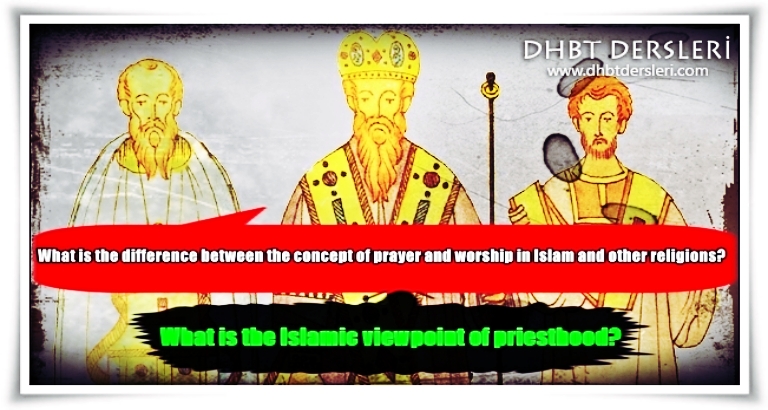What is the difference between the concept of prayer and worship in İslam and other religions?
Islam teaches praying to and worshipping Allah alone. Nobody—be it a prophet, a scholar, a respected person or Satan—has the right to be worshipped by fellow humans. Thus, worshipping anyone/anything besides Allah would be an infringement upon Allah’s right to be worshipped. Islamic prayers are based on sincere intentions. If one starts a prayer with a bad intention, however correct actions and appearance of his prayer are, it will not be accepted.
Islamic prayers are not bound to any specific location or building, save for specific acts of worship like Haj, which can only be performed at a certain time of year and at certain locales in and near Mecca.
Most Christians fulfill religious rights in churches, while Muslims can offer salâh at any clean place. Prophet Muhammad said, “The entire face of Earth is made a prayer place for me” (reported by al-Nasai 42/2). By extension, the entire Earth is a place of worship for his followers at any time and space till the Judgment Day.
In the majority of Christian denominations, a person pertaining to the class of preachers holds prayers. But in Islam, there is no such category or class of preachers. Therefore, any knowledgeable believer can lead other believers in their salâh.
Further, there is no specific attire for performing salâh in Islam. Because there is no class of clergy, there can be no word of specific clerical attire. In cases when imams wear distinct clothes from the rest of the parish, imams wear clothes in accordance with their respective customs.
What is ‘ubudiyyah (servitude)?
What is the difference between worship and ‘ubudiyyah?
Routine and established rituals are called “acts of worship.” But Islamic worship is not composed of rituals alone, neither is a Muslim’s life composed of “ritualistic worships” alone. Because Islam is not a religion of “worship,” but is a religion of “‘ubudiyyah.”
The term ‘ubudiyyah means “Servitude to Allah alone.” Allah says in the Qur’an, “I have not created the invisible beings and men to any end other than that they may [know and] worship Me” (Dhariyat 51:56). The âyah apparently suggests, and we see proof in Prophet Muhammad’s life, that believers in Allah do not need and are to avoid establishing the clergy class and such life.
Therefore, one’s daily routine activities (including eating, sleeping, working, etc.) turn into worshipping Allah if and when done with that intention. Doing so is possible only when one assumes Allah’s guidance as a template for life. Only Allah the Almighty must be the cornerstone and meaning of the human’s entire life. Whenever he reaches such a spiritual state, their work, eating, drinking and other regular daily activities will become part of their servitude to Allah.
What are concrete acts of worship in İslam?
According to the Qur’an, prayers and acts of worship in Islam are not quantified or limited in number. Abiding by all Qur’anic commands and shunning all Qur’anic prohibitions is actually considered acts of worship. For instance, working honestly to deservedly earn or straightforwardly produce halâl (permissible) sustenance is an act of worship.
The following five acts warrant special attention among other prayers and worship acts:
1. Offering obligatory prayers (salâh): A daily prayer bound by time, conditions, and performance acts.
2. Paying alms (zakâh): A purifying financial obligation, which conditions sharing.
3. Fasting in Ramadan: Abstaining from food at daytime during one month a year to achieve taqwah (consciousness of responsibilities).
4. Performing Haj: Visiting the Kâbah and getting together in “the first house” a human being built on the face of Earth in Mecca for the common benefit of humankind.
5. Jihâd: This term means “applying every psychological and physical effort possible” to increase the known common good among humans (ma’rûf) and to decrease the commonly accepted evil (munkar) in society.
Each and every act of prayer and worship is meant and instituted for the purpose of regulating humans’ lives: salâh teaches properly managing time and governing body; zakâh teaches managing financial assets; fasting teaches controlling food consumption desires and sexual lusts; Haj teaches one managing groups and behavior; jihâd teaches managing efforts and energy.
Why is there not a class of priests in İslam?
The Qur’an wants and teaches human to worship Allah directly, for Allah is closer to His servants than their own jugular veins (Qaf 50:16). The issue is the human. In other words, the human is being asked the following question: You believe that you know yourself better than Allah who is closer to you than you jugular vein?!
Instituting vehicles or introducing intermediaries between humans and Allah stems from the flawed concept that Allah is remote and distanced from them. Islam completely refutes and uproots this misconception; doing so is an outright act of shirk (ascribing divinity to others than Allah). And according to the Qur’an, shirk is the greatest sin and greatest injustice.
What is the İslamic viewpoint of priesthood?
Islam neither endorses such a class nor permits it to exist, because doing so would be equal to a futile attempt to steal certain functions from Allah (Tawbah 9:31).
In Islam, nobody is allowed or qualified to speak on behalf of Allah, even if that is Prophet Muhammad. He is tasked with delivering the message he was inspired by revelation (Ma’idah 5:67) and living like any other believing servant of Allah. Nobody is allowed to forgive another fellow human on behalf, indeed instead, of Allah, even if that is Prophet Muhammad. He could only plead with Allah to forgive those who followed his message (‘Ali`Imran 3:159).
Further, in Islam, nobody is qualified to guarantee eternal salvation in the hereafter, even if that is Prophet Muhammad. Allah commands him, “Say: ‘I am not the first of [Allah’s] apostles; and [like all of them] I do not know what will be done with me or with you…’” (‘Ahqaf 46:9).
It is recorded that Prophet Muhammad told his only surviving child before his death: “My daughter Fatima! Save yourself from the Hellfire with your good deeds. I swear by Allah, I cannot do anything for you in the Hereafter!”

































